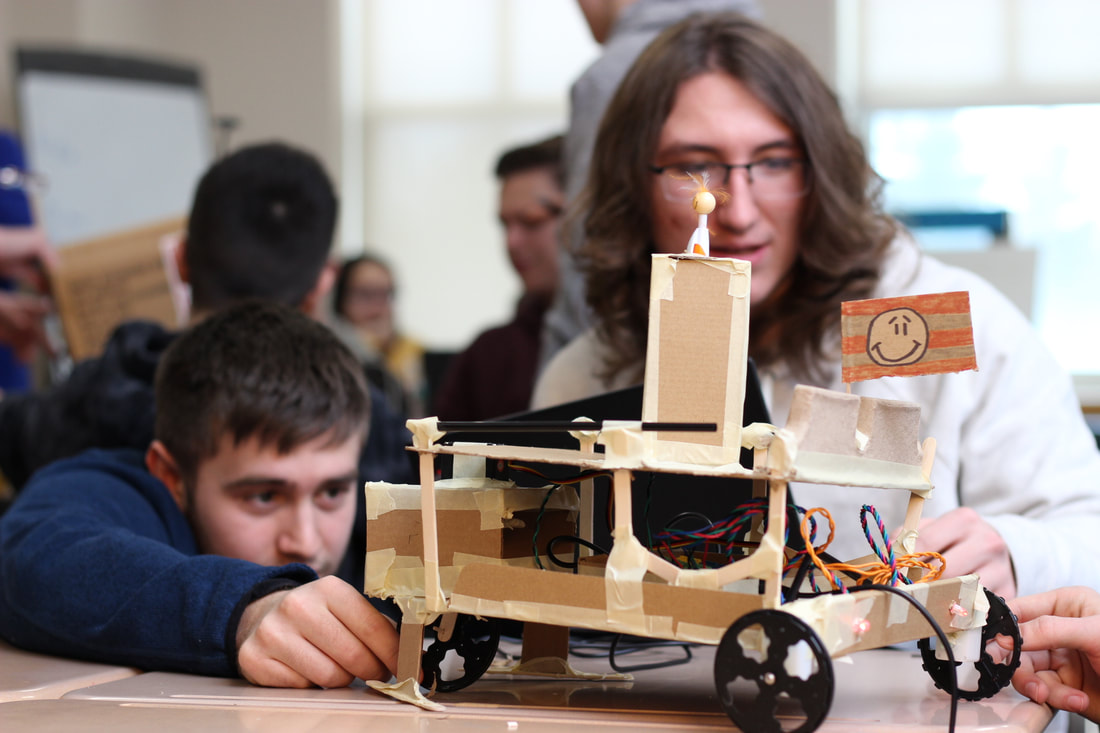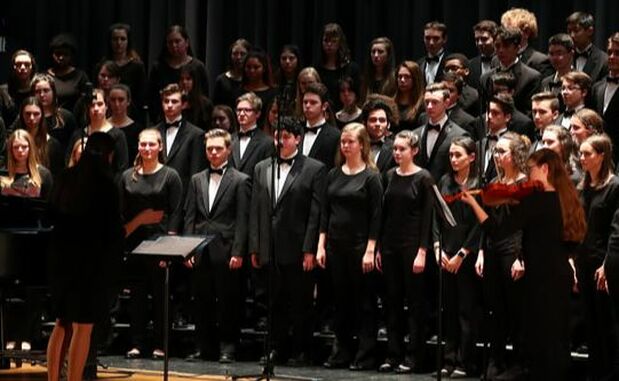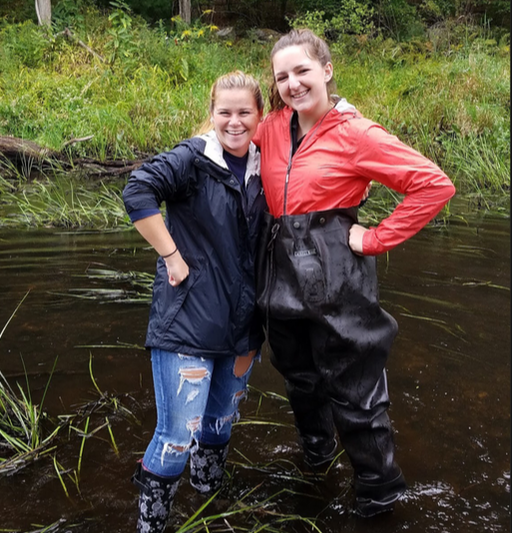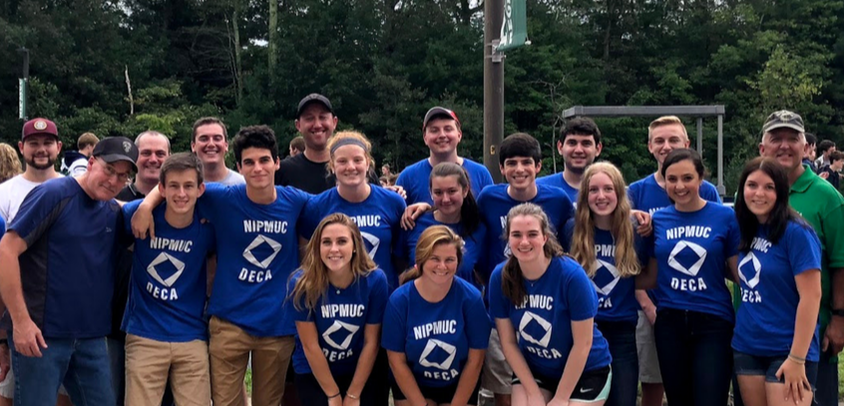AT NIPMUC REGIONAL HIGH SCHOOL
We believe that each LEARNER is unique, inquisitive, and has the potential to be inspired by a true sense of purpose.
We believe EDUCATORS are facilitators of learning who embrace individual student passions and strengths when creating learning experiences that encourage inquiry, develop skills, and have relevance in today's world.
We believe the COMMUNITY is our classroom, encouraging and supporting authentic, enriching, and rewarding learning opportunities for all.
We believe in creating an authentic, welcoming, and collaborative LEARNING ENVIRONMENT where all members of the community are supported, engaged, and provided learning opportunities that challenge and excite them.
We believe EDUCATORS are facilitators of learning who embrace individual student passions and strengths when creating learning experiences that encourage inquiry, develop skills, and have relevance in today's world.
We believe the COMMUNITY is our classroom, encouraging and supporting authentic, enriching, and rewarding learning opportunities for all.
We believe in creating an authentic, welcoming, and collaborative LEARNING ENVIRONMENT where all members of the community are supported, engaged, and provided learning opportunities that challenge and excite them.
|
AGENCY
|
INQUIRY
|
AUTHENTICITY |
OUR CALL TO ACTION
Being a learner in the modern world is exciting because students are presented with various opportunities to experience personally meaningful learning in a connected world. Modern learners have the chance to create and forge meaningful learning experiences and connect with the world around them.
We recognize that the emergence of technology provides boundless access to information and opportunities to create, design, and invent. Technology also connects learners on a local and global level, to foster communication, collaboration, and creativity. Students now, more than ever, are equipped with the tools to innovate, to reimagine their education, and to serve as pioneers in both existing and new fields.
Preparing students for an unpredictable future requires a variety of knowledge, skills, and dispositions.
Although we recognize the changing realities of the modern world, there are current aspects of our professional work that remain important for the future of Nipmuc. We must continue to provide students with opportunities to be introduced to key content and knowledge needed to ignite their passions, broaden their understanding, and develop cultural literacy. We also recognize that we need to continue to prepare our students to achieve in traditional forms of assessment that are valued by colleges and employers.
Because traditional achievement is only one measure of success, we must expand our definition to include moments of reflection, resilience, creativity, collaboration, experimentation, and inspiration.
As our world evolves, our professional practices must reflect and include opportunities to collaborate, reflect, innovate, and initiate. Students should be encouraged to seek novel approaches to learning. As educators, we must continually reflect, review, and revise our professional work to make sure our work supports our definition of learning, beliefs about learning, and the vision of our graduates.
We recognize that the emergence of technology provides boundless access to information and opportunities to create, design, and invent. Technology also connects learners on a local and global level, to foster communication, collaboration, and creativity. Students now, more than ever, are equipped with the tools to innovate, to reimagine their education, and to serve as pioneers in both existing and new fields.
Preparing students for an unpredictable future requires a variety of knowledge, skills, and dispositions.
- As global citizens, students must be able to demonstrate an understanding of others’ needs and understand the value of a diversity of experiences, cultures, and perspectives.
- As solution seekers they need to be able to recognize obstacles, diagnose the issues that limit progress, apply strategies to address their concerns, and reflect on the effectiveness of their response.
- As skillful collaborators, students to work effectively and respectfully with diverse teams in a variety of formats.
- As inspired innovators, they need to be able to elaborate, refine, analyze, evaluate, and iterate their ideas in order to maximize their creative efforts.
- As mindful learners, they need to be able to regulate their emotions, thoughts, and behaviors as they persist toward personal and learning goals.
- As effective communicators, they must articulate and listen with attention to knowledge, values, attitudes, and intentions.
Although we recognize the changing realities of the modern world, there are current aspects of our professional work that remain important for the future of Nipmuc. We must continue to provide students with opportunities to be introduced to key content and knowledge needed to ignite their passions, broaden their understanding, and develop cultural literacy. We also recognize that we need to continue to prepare our students to achieve in traditional forms of assessment that are valued by colleges and employers.
Because traditional achievement is only one measure of success, we must expand our definition to include moments of reflection, resilience, creativity, collaboration, experimentation, and inspiration.
As our world evolves, our professional practices must reflect and include opportunities to collaborate, reflect, innovate, and initiate. Students should be encouraged to seek novel approaches to learning. As educators, we must continually reflect, review, and revise our professional work to make sure our work supports our definition of learning, beliefs about learning, and the vision of our graduates.
NIpmuc's Definition of learning
Who? Everyone is a learner. Learning is not only for students or a select group of people.
What? Learning is an automatic and instinctive process. It involves seeking, acquiring, and applying knowledge and skills in a personally meaningful way. It should not be confused with being able to produce the correct answer or earn the highest grade.
Where? Learning takes place in all aspects of our lives and extends beyond school subjects, assignments, and assessments. Learning does not only take place in schools or educational institutions.
When? Learning can occur throughout all the minutes and moments of our lives. Learning is not limited to the school day or year. Learning doesn’t naturally occur without a personally meaningful context or in experiences that are unnaturally separated into disciplines.
Why? People learn to solve problems, to gain insight into complex and diverse challenges, or to improve an existing condition or situation. People learn because they are naturally curious, creative, competitive, and collaborative. Learning enables people not only to become more independent but also to become a valued member of their communities. People do not learn to pass a test, to make it through the school day, to get a grade, to get into college, or to be the best.
How? Learning occurs by taking risks, trying new things, and reflecting on mistakes. Learning occurs when people make connections between their ideas and their world. Learning occurs when creating a meaningful and authentic product. Learning does not occur when simply memorizing facts and figures. It does not happen naturally through receiving, recording, and repeating information. Learning is limited by rigid thinking and the pursuit of a single right or safe answer.
What? Learning is an automatic and instinctive process. It involves seeking, acquiring, and applying knowledge and skills in a personally meaningful way. It should not be confused with being able to produce the correct answer or earn the highest grade.
Where? Learning takes place in all aspects of our lives and extends beyond school subjects, assignments, and assessments. Learning does not only take place in schools or educational institutions.
When? Learning can occur throughout all the minutes and moments of our lives. Learning is not limited to the school day or year. Learning doesn’t naturally occur without a personally meaningful context or in experiences that are unnaturally separated into disciplines.
Why? People learn to solve problems, to gain insight into complex and diverse challenges, or to improve an existing condition or situation. People learn because they are naturally curious, creative, competitive, and collaborative. Learning enables people not only to become more independent but also to become a valued member of their communities. People do not learn to pass a test, to make it through the school day, to get a grade, to get into college, or to be the best.
How? Learning occurs by taking risks, trying new things, and reflecting on mistakes. Learning occurs when people make connections between their ideas and their world. Learning occurs when creating a meaningful and authentic product. Learning does not occur when simply memorizing facts and figures. It does not happen naturally through receiving, recording, and repeating information. Learning is limited by rigid thinking and the pursuit of a single right or safe answer.
Scheduling process
Three Course Levels
Nipmuc offers courses at three levels of rigor: College Post Secondary (CPS), Honors, and Advanced Placement (AP). Please view below for descriptions of these classes.
College Post Secondary (CPS)
Honors (H)
Advanced Placement (AP)
Course Recommendations
Students are encouraged to take courses that match their interests, curiosities, and needs. Teachers provide recommendations for the level of classes (CPS/Honors/AP) that they believe will be the best fit for the student. These recommendations can be accessed through PowerSchool. Students have the opportunity to take courses at the level of their choice. In cases where students choose to take courses other than those recommended by their teachers - students and parents/guardians can work with teachers and school counselors to gain an understanding of the workload, expectations, and rigor of their selected course.
Course Selection Process
Students and parents/guardians are asked to review the course recommendations and and submit the course requests (languages and electives) via PowerSchool for next school year.
Connect with Nipmuc's School Counselors
Questions about scheduling? Nipmuc's school counselors are available via email to answer questions and support the scheduling process. Feel free to email the Nipmuc School Counseling department by reaching out to:
Nipmuc offers courses at three levels of rigor: College Post Secondary (CPS), Honors, and Advanced Placement (AP). Please view below for descriptions of these classes.
College Post Secondary (CPS)
- Designed to be challenging
- Will help to prepare students for college
- Classes move at a steady but manageable pace
Honors (H)
- Designed to prepare students for competitive four-year colleges
- Class moves at a quicker pace than CPS classes
- Classes review the curriculum with more depth than CPS classes
- Daily homework is an expectation for honors classes
Advanced Placement (AP)
- College-level courses offered during high school
- Curriculum for AP courses is approved through an audit completed annually by the College Board
- Offered for students in grades 11 & 12 (Micro/Macro Economics in grade 10)
Course Recommendations
Students are encouraged to take courses that match their interests, curiosities, and needs. Teachers provide recommendations for the level of classes (CPS/Honors/AP) that they believe will be the best fit for the student. These recommendations can be accessed through PowerSchool. Students have the opportunity to take courses at the level of their choice. In cases where students choose to take courses other than those recommended by their teachers - students and parents/guardians can work with teachers and school counselors to gain an understanding of the workload, expectations, and rigor of their selected course.
Course Selection Process
Students and parents/guardians are asked to review the course recommendations and and submit the course requests (languages and electives) via PowerSchool for next school year.
Connect with Nipmuc's School Counselors
Questions about scheduling? Nipmuc's school counselors are available via email to answer questions and support the scheduling process. Feel free to email the Nipmuc School Counseling department by reaching out to:
- Kendra Swenson: [email protected]
- Meredith Hefez: [email protected]
- Allison Towne: [email protected]




